A new and sophisticated scam has surfaced on social media platforms, exploiting the trust people place in famous figures like Elon Musk. Scammers are using deceptive videos and websites to trick individuals into signing up for expensive monthly subscription services, all under the false pretense of receiving free gold bars worth over $2,100.
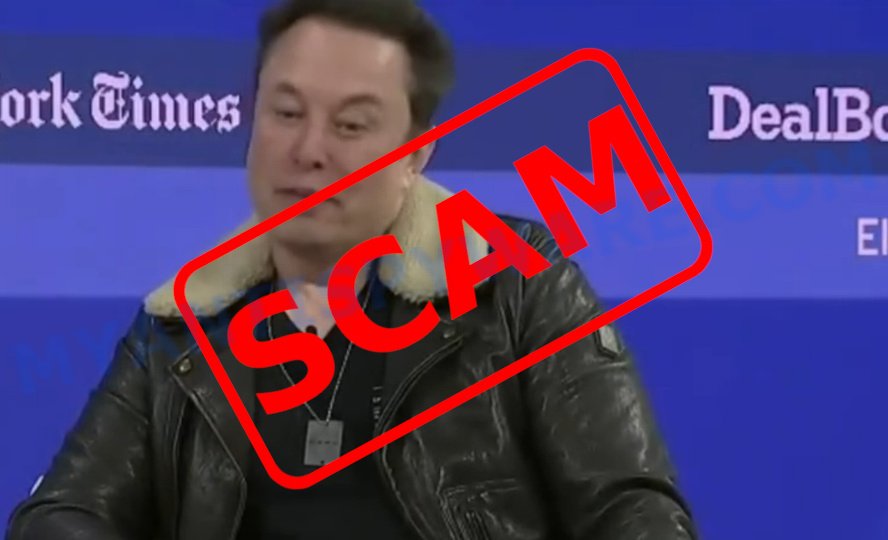
Example ads promoting this scam include messages like: “I am in such a positive place right now and I want to lend a helping hand, so I’m giving away FREE Gold Bars worth over $2,100!”, “Elon’s $2,100 Gold Bar Giveaway Is Here!”. These ads are circulated across social media platforms such as Facebook, Instagram, TikTok, and Twitter.
If you want to know more about this scam, such as how it works, how it can affect you, and ways to avoid falling for similar scams, read our full article. We explain in detail how to identify these scams and protect yourself from online fraud. Our article gives you the information you need to stay safe when you see offers online.
Table of Contents
🚨 Scam Overview
The Elon Musk gold bar giveaway scam is a deceptive scheme circulating on social media, where fraudsters use deepfake videos of Elon Musk to lure people into a fake gold bar giveaway. These scammers promise free gold bars worth over $2,100, directing victims to phishing websites. The scam primarily targets users across platforms like Facebook, Instagram, and TikTok. It’s a complex trap that combines the allure of a popular celebrity with the promise of high-value rewards.
The scam ads read as follows:
#1:
I am in such a positive place right now and I want to lend a helping hand, so I’m giving away FREE Gold Bars worth over $2100!
MODERNTABLETOPGAMINGBLOG.COM
Elon’s $2100 Gold Bar Giveaway Is Here!
#2:
I am in such a positive place right now and I want to lend a helping hand, so I’m giving away FREE Gold Bars worth over $2100!
HOMECOMPUTERBUILDERBLOG.COM
Make This Holiday Brighter Than Ever With My Gift!
🚩 Signs of the Scam
- Deepfake Videos of Elon Musk: The scam features realistic but fake videos of Elon Musk promoting the giveaway.
- Promises of High-Value Gold Bars: Ads claiming to give away gold bars worth over $2,100.
- Links to External Websites: The videos and ads redirect users to external sites for claiming the prize.
- Requests for Personal Information: These sites ask for personal details and consent to terms and conditions.
- Hidden Subscription Fees: The fine print reveals costly monthly subscription plans unrelated to the giveaway.
In summary, the Elon Musk gold bar giveaway scam is a sophisticated fraud leveraging the image of a famous entrepreneur to deceive individuals. It baits victims with the promise of free gold, leads them to fraudulent websites, and tricks them into signing up for expensive subscriptions. The scam is characterized by its use of deepfake technology, high-value promises, and hidden costs. Victims are left with recurring charges instead of the promised gold bars, highlighting the importance of vigilance in the face of too-good-to-be-true offers on social media.
🕵️♂️ How the Elon Musk Gold Bar Giveaway Scam Works
The Elon’s $2100 Gold Bar Giveaway scam is a deceptive scheme increasingly prevalent on social media platforms. Central to this scam is the use of fake advertisements offering free gold bars, falsely attributed to high-profile celebrities like Elon Musk. These ads mislead people into visiting scam websites where they’re tricked into giving away personal and credit card information, under the guise of participating in a gold bar giveaway.
🔗 Social Media Post
Scammers post on social media platforms such as Facebook, TikTok, and Instagram, leveraging Elon Musk’s name and the allure of free gold bars to draw attention. These posts may feature convincing images of gold bars and persuasive text to generate excitement. Users, deceived into believing the posts are legitimate, are enticed to click on them.
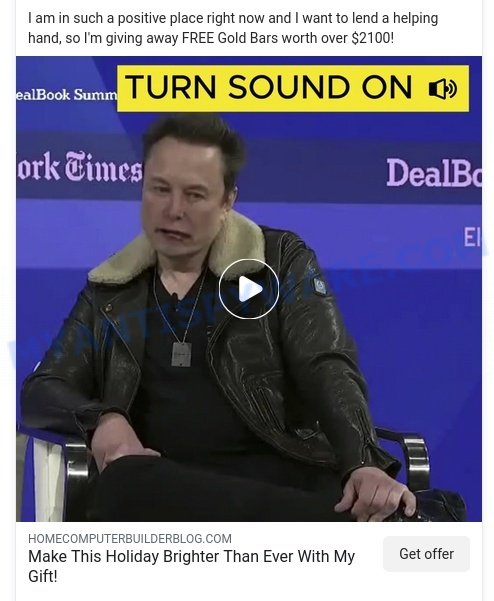
📰 Fake News Articles
The social media ads lead to counterfeit news websites, like moderntabletopgamingblog.com or homecomputerbuilderblog.com, hosting articles falsely claiming Elon Musk’s involvement in a gold bar giveaway. These articles are designed to look authentic, with compelling headlines and realistic details. The website mimics legitimate news sources, enhancing the scam’s credibility.
📊 Fake Survey for Personal Information Collection
On these fraudulent news sites, users are prompted to complete a survey to enter the giveaway. This survey serves as a front to collect personal information. The questions are simple, giving users a false sense of security. Completing the survey provides scammers with valuable data for potential identity theft or resale.
🎉 ‘Congratulations, Claim Offer’ Prompt
Following the survey, users see a message congratulating them and inviting them to claim the gold bars. This step is crafted to make users feel like they’ve won something valuable, building trust and excitement and encouraging them to proceed. Clicking to claim the offer leads them deeper into the scam.
🛍️ Entering Personal Data
Users are redirected to sites like prizequestcentral.com, where they are asked to enter more personal details, supposedly to receive the gold bars. These sites are styled to resemble legitimate shopping sites, with product descriptions and images. The request for personal details is framed as a requirement for shipping the ‘won’ items.
💳 Credit Card Details for Shipping Payment
On these websites, users are asked to provide credit card details to cover a nominal shipping cost for the free gold bars. This step is crucial for the scammers, as it allows them access to financial information. The small shipping fee is designed to make the scam appear more legitimate, with users more likely to provide their details, thinking they are securing a valuable deal.
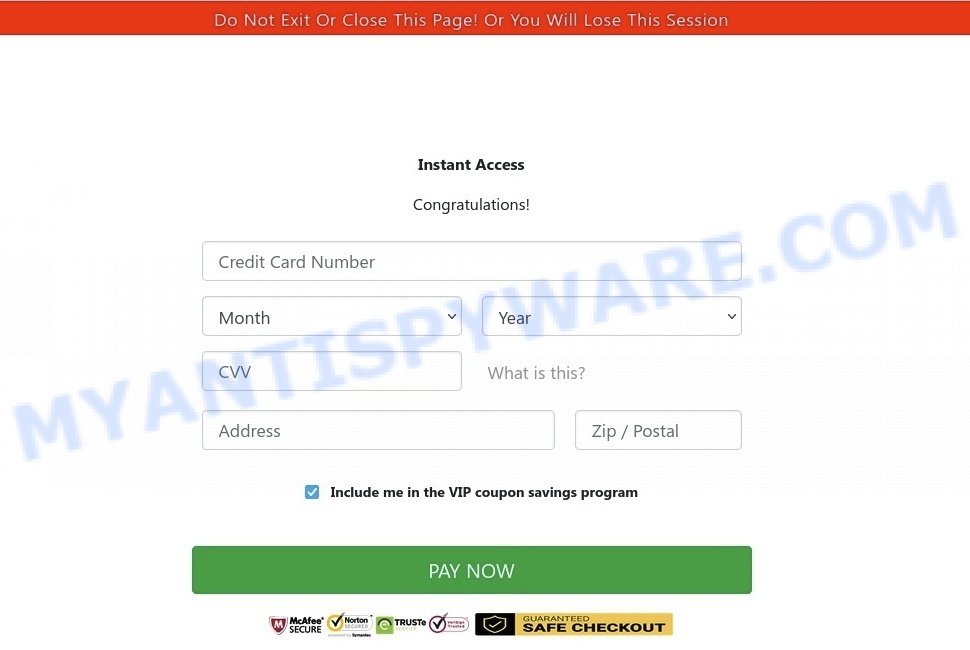
📑 Hidden Terms with Malicious Subscriptions
The terms and conditions on these sites reveal that by participating, users unwittingly agree to substantial subscription fees. These terms often include a one-time charge and an ongoing monthly fee, cunningly hidden to avoid detection by most users. By agreeing to these terms, victims are enrolled in expensive recurring subscriptions, often not realizing it until they see charges on their bank statements. This tactic aims to extract as much money as possible before the user becomes aware of the scam.
To stay safe, always be skeptical of offers that seem overly generous, and verify any promotions through official and recognized channels. Refrain from sharing personal or financial information on questionable platforms.
💡 Beware of Similar Scams
Scams like the Elon Musk Gold Bar Giveaway are not isolated incidents. They are part of a broader pattern of online fraud targeting fans of celebrities and popular products. Here are other notable examples:
Le Creuset Giveaway Scam Involving Joanna Gaines, Oprah, Ellen, Trisha, and More
Similar to the Elon Musk Gold Bar Giveaway scam, this one promised users a chance to get a premium Le Creuset product for a fraction of its regular price or as a giveaway. However, those who fell for the trap either never received the product or found unrelated items added to their online shopping carts.
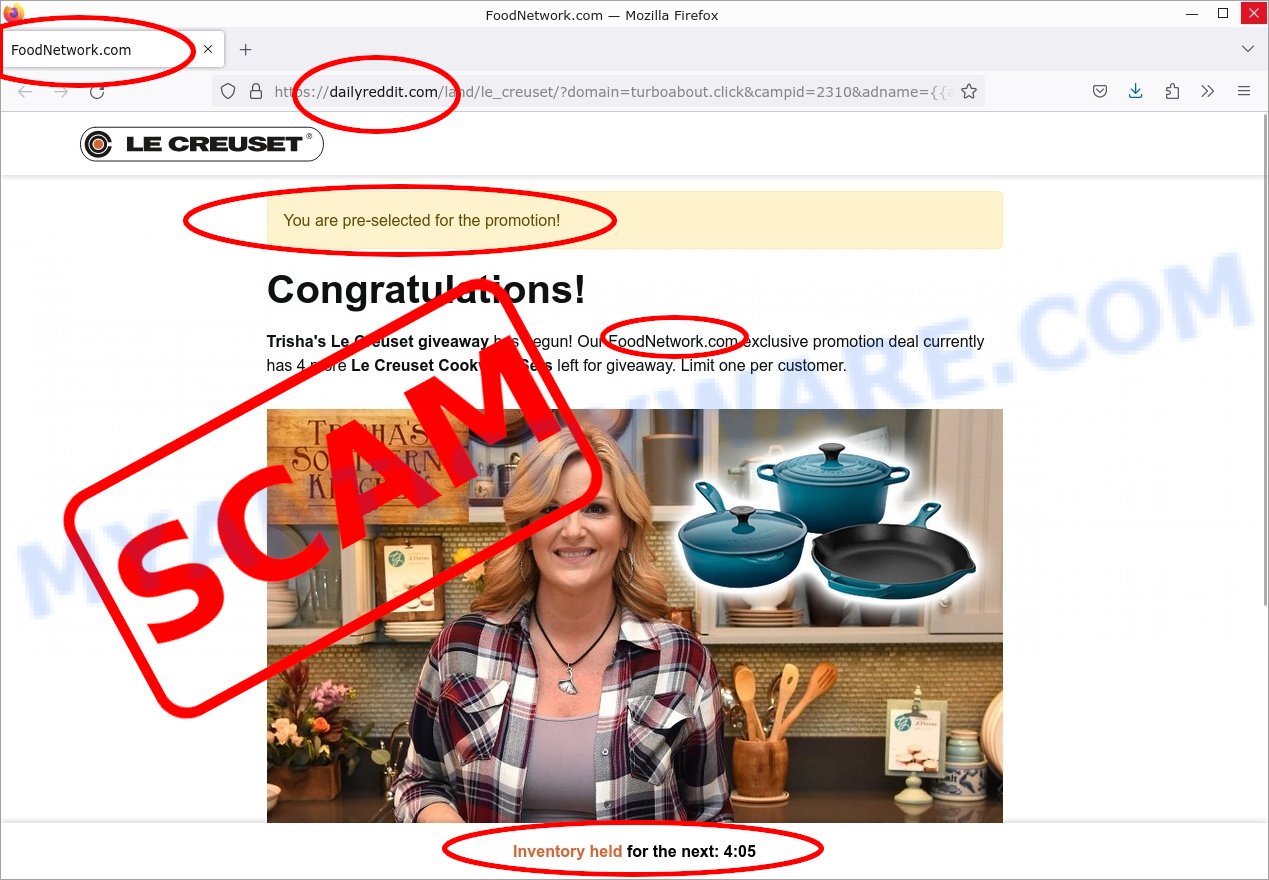
Guy Fieri Pit Boss Scam
This scam leveraged the popularity of celebrity chef Guy Fieri to deceive people on Facebook. It promised a free Pit Boss grill, a popular brand in the barbecue community, supposedly endorsed by Fieri. Similar to the Le Creuset scam, users were led through a series of steps, including surveys and personal information submission, under the guise of winning a grill. This scam likely ended with requests for shipping fees or other payments, harvesting both personal data and financial information.

Mr Beast Giveaway Scam
The popular YouTuber Mr Beast is known for his legitimate and extravagant giveaways. Scammers took advantage of his reputation by creating fake giveaway campaigns in his name, asking participants to provide personal details or even make a small payment to qualify.

Shein Summer Giveaway Scam
The popular online clothing store Shein was used as a front for this scam. Users were promised huge summer giveaways, often with the caveat of paying minimal fees or sharing the giveaway with friends. However, the “giveaways” never materialized, and many participants reported data breaches or suspicious online activity afterward.
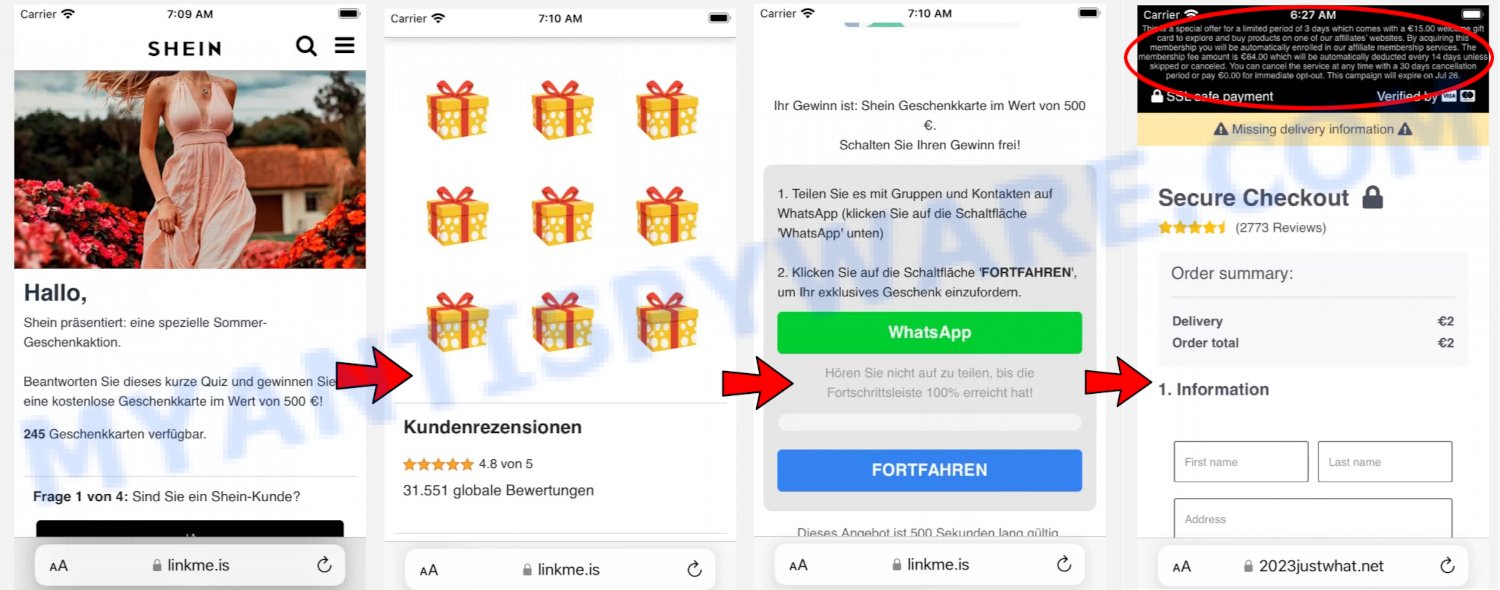
It’s essential to remember that if an online offer sounds too good to be true, it often is. Always approach such deals with caution, verify them through official channels, and never share personal or financial information without thorough scrutiny.
😱 What to Do If Scammed
If you’ve been caught up in the Elon Musk Gold Bar Giveaway scam, don’t panic. It’s important to act quickly to protect yourself and your finances. Here’s a step-by-step guide on what to do next:
🏦 Contact Your Financial Institution
Immediately inform your bank or credit card company about the unauthorized transaction. They may be able to stop the transaction, reverse it, or even issue a chargeback. Request a new credit/debit card if you believe your card details have been compromised. Document any financial losses. This can be essential for investigations and potential reimbursements.
🔐 Change Passwords
If you suspect your personal information, especially passwords, have been compromised, change them immediately. This is crucial for accounts linked to financial institutions or personal data. Consider using a reputable password manager to ensure strong, unique passwords for each account.
👀 Monitor Your Accounts
Keep a close eye on your bank and credit card statements for the next several months. Look for any unauthorized or suspicious transactions, no matter how small. Consider enrolling in a credit monitoring service. Some services will alert you to changes in your credit report, potentially indicating identity theft.
🚔 Report the Scam
If you encountered scam ads on Facebook, Instagram, TikTok or other platforms, report them so they can be removed.
💻 Check Your Computer
If you’ve downloaded any file or clicked on any links, your device might be infected. Run a comprehensive antivirus scan.
📘 Educate Yourself
Familiarize yourself with common scam tactics to avoid falling victim in the future. Stay updated on recent scams or phishing methods by following news sources or official government warnings.
📢 Inform Others
Warn friends and family about the scam, especially if it’s widespread. Sharing your experience can help protect others from the same pitfalls.
Summary Table
| Name | Elon Musk Gold Bar Giveaway Scam |
| Type | Online Giveaway/Shopping Scam |
| Fake Claims | Free gold bars worth over $2,100, purportedly given away by Elon Musk. |
| Disguise | The scam is disguised using deepfake videos of Elon Musk, false endorsements, and counterfeit website interfaces mimicking legitimate news or contest portals. |
| Scammers’ websites | Websites like qmoderntabletopgamingblog.com, homecomputerbuilderblog.com, etc., which are set up to appear as legitimate giveaway or news sites. |
| Credit Card Charge | Exquisitehandcraftedje 8772153369 8778255484 NC |
| Damage | Victims are tricked into sharing personal and financial information, leading to unauthorized subscriptions and recurring credit card charges, often around $180 per month. |
| Distribution | Distributed through social media platforms like Facebook, Instagram, and TikTok using misleading posts, ads, and deepfake videos. |
| Indicators of the scam | UUse of deepfake videos, high-value prize claims, suspicious external links, unverified celebrity endorsements, non-functional terms & conditions links, unrealistic offers requiring minimal engagement. |
| Prevention Tips | Verify the legitimacy of offers, be cautious of high-value giveaways, avoid sharing personal information on suspicious sites, check for verified badges on celebrity accounts, and be skeptical of offers requiring financial commitments. |
| Reporting Info | Report suspicious ads directly on social media platforms; For financial fraud, contact your bank immediately; In the U.S., consider reporting to the Federal Trade Commission (FTC) at reportfraud.ftc.gov. |
How to Spot Elon Musk Giveaway Scam Websites
Identifying these signs can help you avoid falling for scam websites masquerading as Elon Musk gold bar giveaways. Always exercise caution and verify the legitimacy of a website before engaging or providing any personal information. Here’s what to look for:
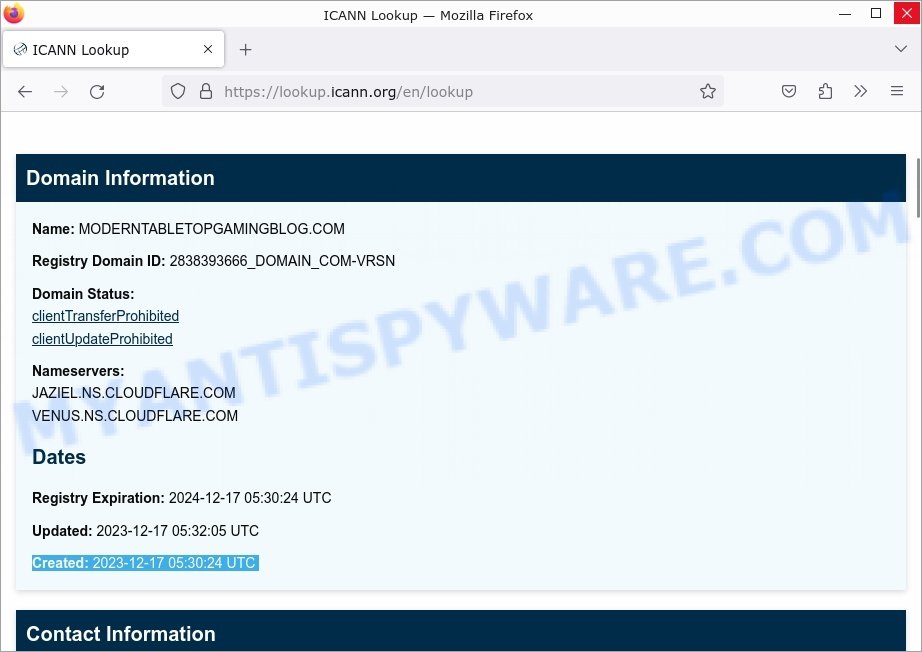
🖼️ Photos of Elon Musk and Gold Bars
Look for images showing Elon Musk surrounded by gold bars or large amounts of cash. These are typically used to give a false impression of the legitimacy and grandeur of the prize.
🛡️ Unauthorized Use of Logos
Beware of the Tesla emblem, SpaceX rockets, and logos from reputable news sources like The New York Times and CNN. These logos are used without permission to falsely convey trustworthiness and authenticity.
🎥 Misleading Animations
Be cautious of animations on these sites that depict wealth and success, such as spaceships taking off, mining carts filled with gold, or gold vault doors opening. These animations are designed to subconsciously suggest the possibility of gaining wealth by participating.
❌ Non-Functional Terms and Conditions Links
Watch out for checkboxes linked to terms and conditions that are unresponsive, don’t lead to any actual policy, or redirect to unrelated content. This is a common tactic to prevent users from reading the fine print.
📜 Hidden Subscription Text
Pay attention to small text that is hard to notice, often embedded in lengthy terms and conditions. This text usually contains information about enrolling users in expensive monthly subscription plans for services like wellness products or psychic readings, unrelated to the supposed giveaway.
💬 Explicit Subscription Warnings
Look for clear statements often buried in the fine print, such as, “You will be billed $180 every 30 days after a 10-day trial period”. Such statements are a major red flag indicating a subscription trap.
🌐 Recent Domain Registration
Investigate the website’s domain registration date. Scam websites are often recently created, with registration dates within the last month, frequently from registrars known for offering anonymous and cheap domain purchases.
🎭 Hidden Domain Ownership
Check if the website uses privacy protection services to hide the owner’s details. Legitimate websites usually don’t need to hide this information, so anonymity can be a sign of a scam.
📊 Inadequate Privacy Policies
Examine the website for its privacy and data handling policies. Sometimes, these can be found in the website’s source code or on platforms like GitHub. Poorly defined, missing, or suspicious privacy policies are a strong indication of a scam.
How to Identify Elon Musk Giveaway Scams on Facebook
Identifying these signs on Facebook can help you steer clear of the Elon Musk giveaway scams and protect your personal information. Always approach such offers with skepticism and verify the legitimacy of any giveaway before engaging or sharing details. Here’s what you need to look out for:

🔍 Deepfake Videos on Facebook
Be cautious of videos that convincingly depict Elon Musk announcing a gold bar giveaway. These are often AI-generated deepfakes, made to look highly authentic, using advanced technology to mimic Musk’s appearance and voice.
🔖 Pressuring Captions in Posts
Stay alert for captions that create a sense of urgency and scarcity, like “Free Gold Bars”, “Elon Musk Gold Bar Giveaway”, or “Act Fast – Limited Time Offer”. These phrases are designed to pressure viewers into quick, thoughtless action.
🔗 Links to External Websites
Watch out for links embedded in posts or page bios that redirect to external domains. These often include misleading terms like “sweepstakes”, “quest”, “prize”, or “giveaway” and lead to websites designed to look like legitimate contest pages, but are actually phishing sites.
🖼️ Photoshopped or Edited Images
Be skeptical of images that show Elon Musk with large quantities of gold bars or piles of cash. These images are often edited or photoshopped to add a false sense of legitimacy and wealth to the scam.
✨ Overly Flashy Graphics
Overuse of bright, flashy graphics, and animated overlays in posts can be a deliberate tactic to grab attention and distract from the lack of genuine content or legitimacy of the offer.
🚫 Posts from Unrecognized Sources
Exercise caution when encountering posts from pages or accounts that you don’t follow, especially if they promise high-value prizes like gold bars or cryptocurrencies in exchange for personal information or minimal interaction.
✔️ Lack of Verification Badge
Check for the presence of a verification badge (blue checkmark) on accounts claiming to be public figures like Elon Musk. Authentic posts from celebrities will come from verified accounts; scam posts often lack this verification and originate from unverified or fake accounts.
How to Identify Elon Musk Giveaway Scams on Instagram
Recognizing Elon Musk Giveaway Scams on Instagram is essential for online safety. Here’s a guide to help you spot these scams:

🚨 Misleading Titles in Paid Posts
Exercise caution with Instagram posts featuring titles like “Elon Musk Wants To Give You Free Gold”. These often use attention-grabbing captions and claims of winning thousands in precious metals to lure users.
💰 High-Value Prize Claims
Be skeptical of any posts suggesting the chance to win significant amounts of gold or money. Authentic giveaways of this magnitude are rare and typically well-documented outside of social media.
📹 Black-and-White Deepfake Videos
Watch out for deepfake videos of Elon Musk that have been altered to black-and-white. These often include overlay graphics that mimic credible broadcast networks, attempting to convey false legitimacy.
✂️ Unusual Video Edits
Be cautious of videos showing signs of editing, such as abrupt cuts or added graphics. These edits are made to create a more credible or official appearance but often signal a scam.
🔄 Giveaway Offers for Engagement
Stay alert to accounts that propose giveaways of precious metals, jewels, or cryptocurrency in return for social media engagement like likes, follows, or clicking on article links. These often contain hidden terms for costly monthly subscriptions.
🔗 External Links in Bios
Be wary of profiles with bio links leading to external, suspicious domains. These are used in scams to begin processes that offer seemingly high-value prizes for minimal engagement, usually as a trap to harvest personal data or enroll users in subscriptions.
✔️ Lack of Verification Badge
Genuine celebrity accounts, like Elon Musk’s, are typically verified with a blue checkmark. Scam accounts often lack this badge, indicating their lack of authenticity.
📉 Inconsistencies in Account Activity
Check for any discrepancies in an account’s posting history or engagement patterns. Genuine celebrity accounts have a consistent history and engagement style, while scam accounts may show irregularities or sudden changes in content and interaction style.
How to Identify Elon Musk Giveaway Scams on TikTok
TikTok is another platform where Elon Musk Giveaway Scams are prevalent. Here are key signs to help you identify these scams:
🎥 Green Screen Edits in Videos
Be cautious of TikTok videos featuring Elon Musk against backgrounds that look like gold mines, vaults, or luxury settings. These are often created using green screen technology to fabricate a setting that suggests wealth and credibility.
📸 Stock Footage Inclusions
Watch for videos that integrate stock footage of gold bars, cryptocurrency symbols, or extravagant items. Scammers use this footage to create a false narrative of legitimacy and wealth associated with the giveaway.
📢 Duet Scam Tactics
Look out for TikTok duets where the original content warning about scams is cut off, leaving only the misleading promotional part. These often start as awareness videos but are edited to promote the scam.
🔀 Manipulated Interviews
Stay alert for videos that use jump cuts or edits to splice old interviews with celebrities, making it appear as though they are directly offering prize packages. This tactic is used to mislead viewers into thinking the giveaway is personally endorsed.
🔗 Engagement for Prizes
Be skeptical of TikTok videos promising high-value rewards like gold bars or cryptocurrencies in exchange for likes, follows, shares, or comments. Genuine giveaways rarely require such direct social media engagement.
🌟 Unrealistic Offers
Offers that seem too good to be true, such as winning large sums of money or expensive items for simple actions like following an account or liking a video, are usually scams.
✅ Lack of Verified Badge
Genuine accounts of public figures, including Elon Musk, have a verified badge on TikTok. If an account claiming to be a celebrity lacks this badge, it’s likely a scam.
🚩 Inconsistent Posting Patterns
Be cautious of accounts with erratic posting behavior or content that significantly deviates from what a genuine celebrity account would post. Scam accounts may have inconsistent themes, low-quality posts, or sudden changes in content style.
Conclusion
The Elon Musk gold bar giveaway scam is a sophisticated and well-orchestrated online fraud. Leveraging the popularity of social media platforms, scammers entice users with the lure of free gold bars, purportedly offered by Elon Musk. This tactic is primarily designed to harvest personal and financial information from unsuspecting victims. The scammers operate through fraudulent websites, such as moderntabletopgamingblog.com and homecomputerbuilderblog.com, which are cleverly disguised to resemble legitimate news or giveaway portals, thereby adding a layer of false credibility to their scheme.
The scam process often involves victims watching deepfake videos, clicking on misleading links, filling out surveys, and providing personal details and credit card information under the guise of claiming a prize or covering minimal shipping fees. This method is meticulously designed to deceive and convince individuals of the offer’s authenticity. However, the underlying intention is to enroll the victims in hidden subscription services, resulting in unforeseen and recurring charges on their credit cards.
This deceptive scheme highlights the critical need for caution and thorough examination of online offers, particularly those that require personal or financial information. Always verify the authenticity of such promotions and be mindful of the potential risks involved in engaging with too-good-to-be-true offers on social media.

















